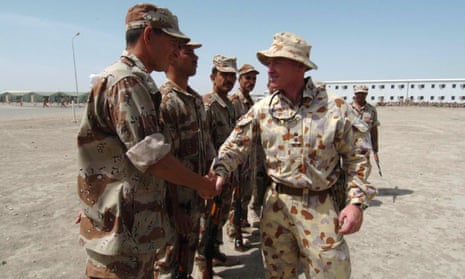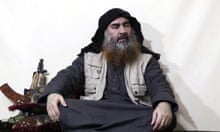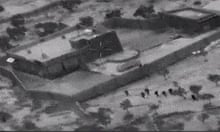Tony Abbott has confirmed the deployment of 330 Australian personnel to help train the Iraqi army and refused to rule out the mission lasting longer than the planned deadline of two years.
The prime minister said on Tuesday his cabinet had approved the move as part of the fight to reclaim territory from Islamic State.
Abbott has also left the door open to potential involvement in air strikes in Syria.
The departure of trainers for Iraq follows the government’s decision in March to start preparing for such a mission, which he said at the time would be subject to final signoff.
Abbott said the personnel, largely drawn from the army’s 7th brigade based in Brisbane, would work alongside 100 New Zealand military personnel at the Taji military complex north of Baghdad.
They begin leaving on Wednesday and the team should be fully operational by May, he said.
Abbott emphasised it was a “training mission, not a combat mission” and was “currently planned to run for two years, with progress to be reviewed regularly”.
The New Zealand prime minister, John Key, has previously said he was determined for the New Zealand troops to leave Iraq within two years and it was “quite probable Australia will stay longer”.
When asked whether it was likely or possible that Australia would stay longer than New Zealand, Abbott kept his options open.
“Let’s focus on what’s planned and announced and what’s planned is that this will be a two-year deployment with a formal review after 12 months, but … obviously we keep these things under constant review,” Abbott said on Tuesday.
“The important thing is to make an effective and meaningful contribution to the security of the wider world because, as I say, this is not just about Iraq; this is about our national security, too.”
Abbott was also asked to outline the benchmarks for success.
“What we hope to have achieved within two years, in conjunction with our partners, is to help train an effective Iraqi regular army that is at the disposal of the legitimate government of Iraq and is able to gain and hold ground and do so in accordance with the ordinary rules of combat,” he said.
Abbott said the Australian government had made “no decision” on expanding its air strikes to Syria and had no plans to do so “at this stage”.
“Obviously we’re conscious of the fact that the Canadians have indicated that they will extend air strikes into Syria if required,” he said.
“I should point out that our Awac aircraft and our refuellers are supporting coalition air operations throughout the theatre, so while we aren’t launching air strikes ourselves inside Syria, we are supporting air strikes by other coalition partners inside Syria.
“They’re not crossing into Syrian air space, but the aircraft they are controlling and refuelling are in some cases crossing into Syrian air space to carry out strike missions.”
The deployment of a training mission to Iraq follows the Australian government’s decision in 2014 to send combat aircraft to join US-led strikes against Isis targets in Iraq.
The earlier decisions involved an Australian air task group of 400 personnel, along with 200 special forces soldiers to “advise and assist” the Iraqi military in the fight against Isis.
The leader of the Greens, Christine Milne, said there had been “mission creep from day one” and the objectives were ill-defined.
Milne said Abbott “was so determined to follow the US into another horrific war in Iraq that he has failed to think through the long-term consequences of this engagement in the Middle East”.
“We have a situation where we have Shi’ite militias fighting alongside Iraqi troops, we have Iraqi special units under investigation for war crimes,” Milne said on Tuesday.
“It is a mess that the prime minister is committing our troops to being part of. It will not keep Australia safer. In fact, our engagement in Iraq in the complete sectarian mess and fighting going on there actually makes the propaganda that [Isis] is putting out even worse in terms of trying to attract young people from around the world as more and more foreign boots come on the ground.”
Abbott said Australia’s mission was to work with the Iraqi regular army, and not with “irregulars” or “informal, armed groups”.
“Now, obviously Shi’ite militia had a significant role along with it seems some Iranian Special Forces in the retaking of Tikrit,” he said.
“I think the stronger the Iraqi regular army is, the less likely it is that Shi’ite militia will play a continuing role in the ultimate retaking of the country. So, by strengthening the Iraqi army, we are giving the Iraqi government a whole lot of options that it may not currently have.”
The Labor party has previously offered its support to proposed Australian training mission, but called on the government “to clearly articulate an exit strategy”.
Labor has repeatedly said that Australian operations should be confined to Iraq and the troops should be withdrawn “if the Iraqi government and its forces engage in unacceptable conduct”.










Comments (…)
Sign in or create your Guardian account to join the discussion